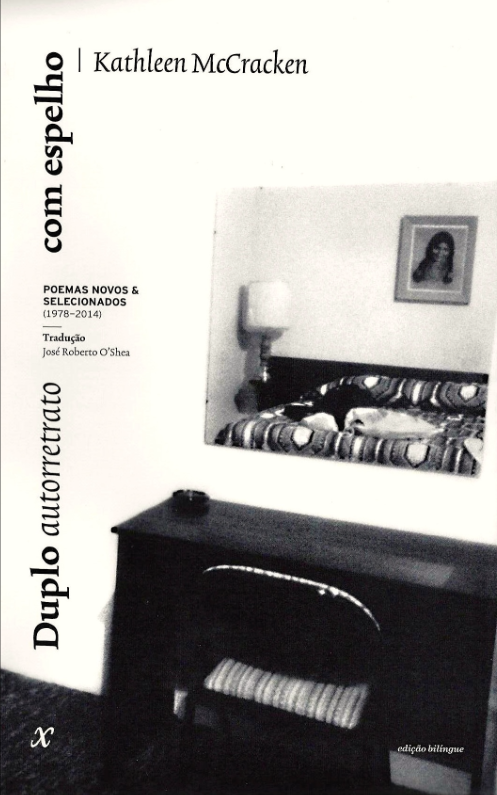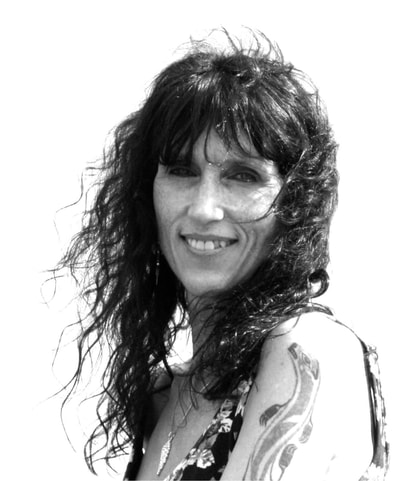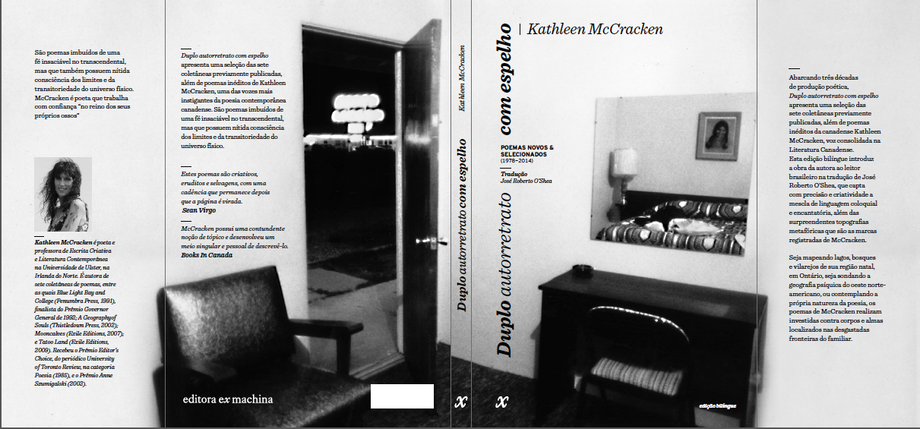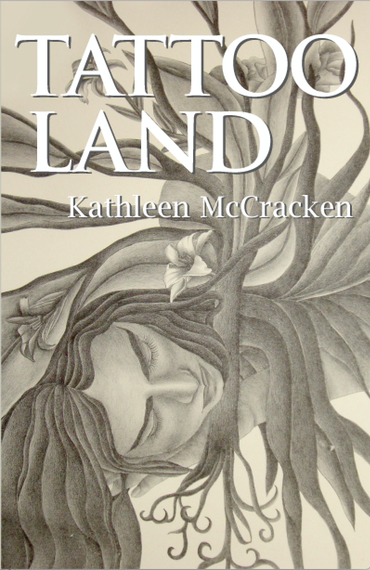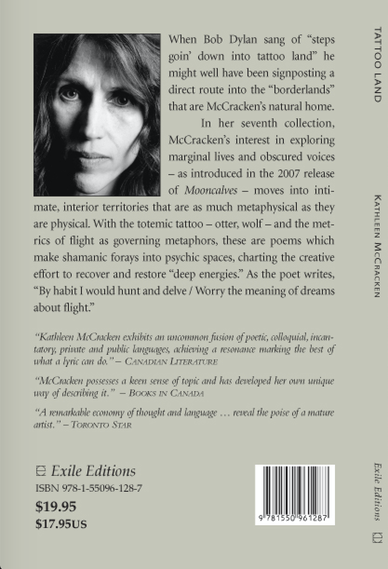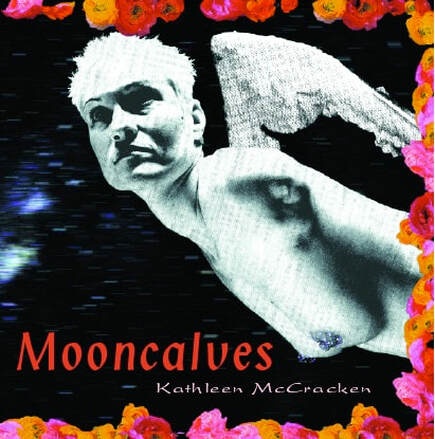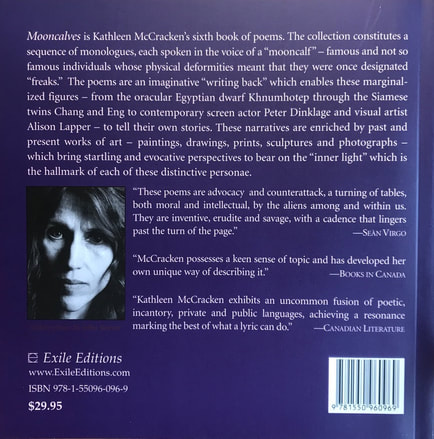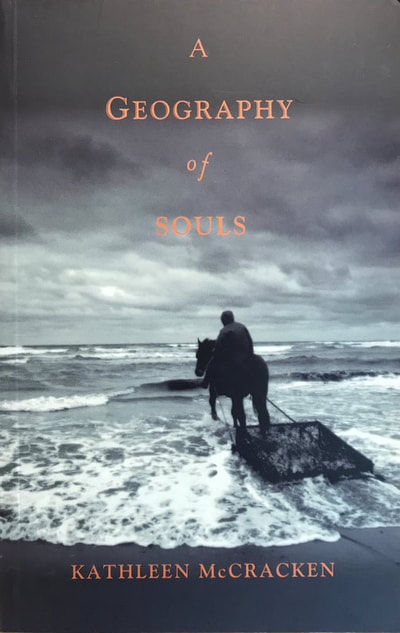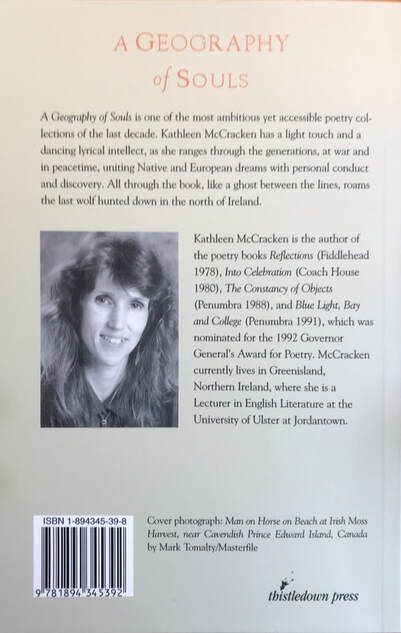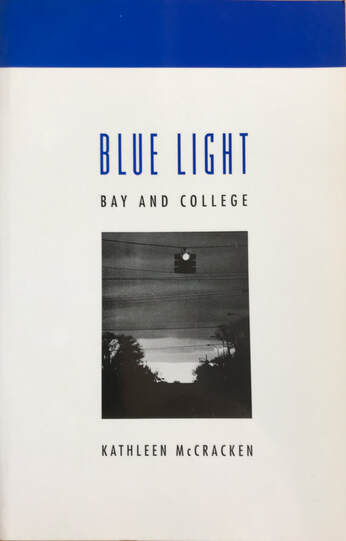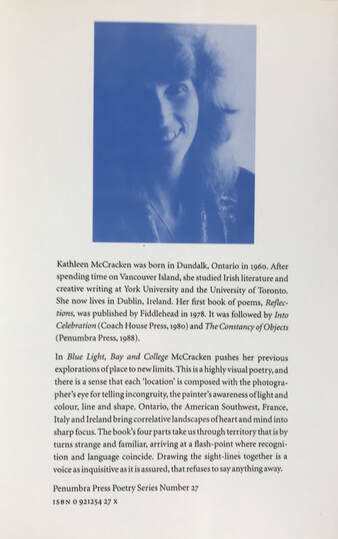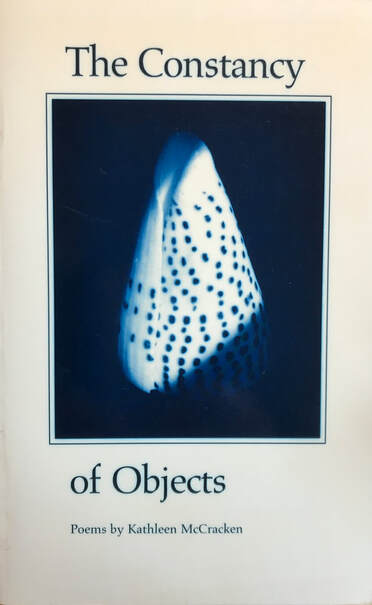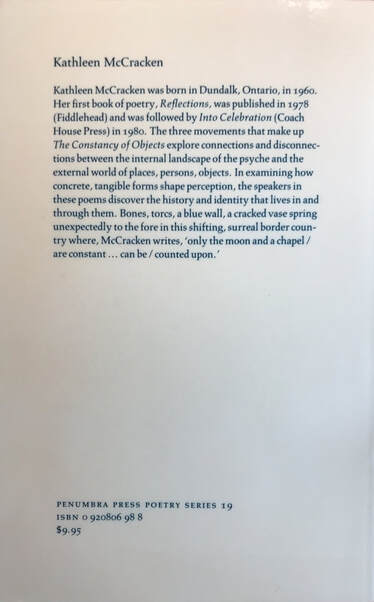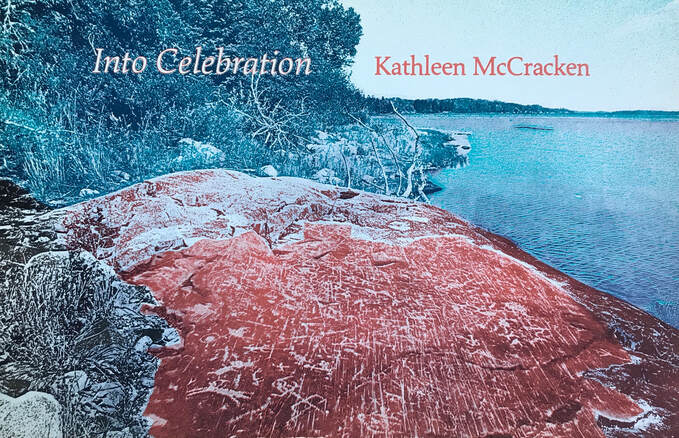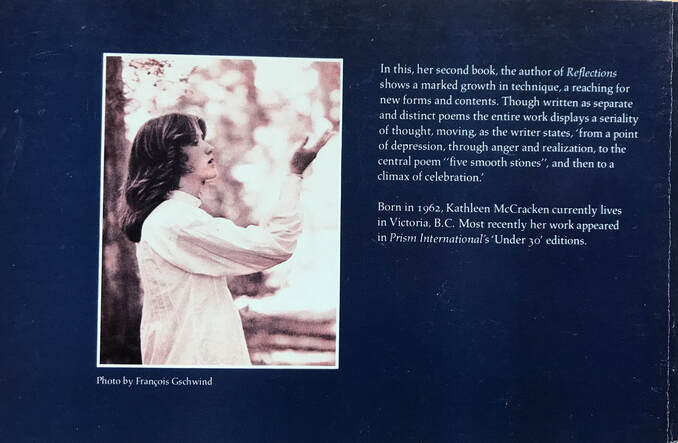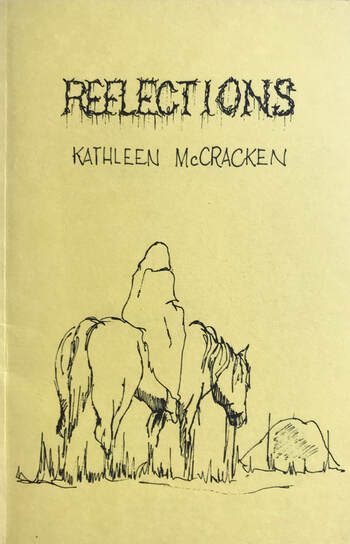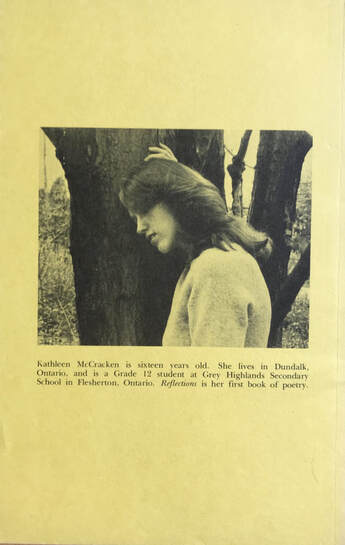Kathleen McCracken
Books
Copies available for purchase via No Alibis Bookstore
83 Botanic Avenue
Belfast BT7 1JL
028-90-319601
http://noalibis.com
Email David Torrans [email protected]
or Kathleen McCracken at [email protected]
83 Botanic Avenue
Belfast BT7 1JL
028-90-319601
http://noalibis.com
Email David Torrans [email protected]
or Kathleen McCracken at [email protected]
Bilingual English-Brazilian Portuguese Edition
With a Preface by Medbh McGuckian
Double Self Portrait with Mirror: New & Selected Poems (1978-2014) is a milestone publication from Canadian poet Kathleen McCracken. Published by Brazil’s innovative Editora Ex Machina press, this bilingual edition brings together a group of startlingly original new poems with selections from her seven previously published collections.
Translated by José Roberto O’Shea, organized by Beatriz Kopschitz Bastos and including a preface written by Medbh McGuckian, this initial volume in Ex Machina’s series of English-Brazilian Portuguese poetry books introduces McCracken’s work to Brazilian readers for the first time. For those familiar with her poetry, it offers a compilation that is testimony to the consistency and the diversity of her vision. As McGuckian writes in her preface, ‘Double Self Portrait with Mirror showcases the artist in her fruitful prime. A bilingual edition of integrity and elegance, it will encourage a wider appreciation of her ongoing work as a Canadian poet of international repute, at the same moment as it marks the emergence of an important new voice in Brazil’s vibrant catalogue of contemporary literature in translation.'
O’Shea’s translation captures with precision and creativity McCracken’s blend of the colloquial and the exotic, and renders exactly the surprising metaphorical topographies that are her trademark. Whether she is mapping the lakes, woods and rural towns of her native Ontario or sounding out the psychic geography of the American West, the poems in Double Self Portrait with Mirror flash with meanings that are fleeting yet sustaining. McCracken’s is a poetry intensely aware of the limits of the physical universe, yet which breathes an insatiable faith in the transcendental.
Editora Ex Machina is at http://editoraexmachina.com.br, and the editors can be contacted via Facebook, Twitter or at [email protected]
With a Preface by Medbh McGuckian
Double Self Portrait with Mirror: New & Selected Poems (1978-2014) is a milestone publication from Canadian poet Kathleen McCracken. Published by Brazil’s innovative Editora Ex Machina press, this bilingual edition brings together a group of startlingly original new poems with selections from her seven previously published collections.
Translated by José Roberto O’Shea, organized by Beatriz Kopschitz Bastos and including a preface written by Medbh McGuckian, this initial volume in Ex Machina’s series of English-Brazilian Portuguese poetry books introduces McCracken’s work to Brazilian readers for the first time. For those familiar with her poetry, it offers a compilation that is testimony to the consistency and the diversity of her vision. As McGuckian writes in her preface, ‘Double Self Portrait with Mirror showcases the artist in her fruitful prime. A bilingual edition of integrity and elegance, it will encourage a wider appreciation of her ongoing work as a Canadian poet of international repute, at the same moment as it marks the emergence of an important new voice in Brazil’s vibrant catalogue of contemporary literature in translation.'
O’Shea’s translation captures with precision and creativity McCracken’s blend of the colloquial and the exotic, and renders exactly the surprising metaphorical topographies that are her trademark. Whether she is mapping the lakes, woods and rural towns of her native Ontario or sounding out the psychic geography of the American West, the poems in Double Self Portrait with Mirror flash with meanings that are fleeting yet sustaining. McCracken’s is a poetry intensely aware of the limits of the physical universe, yet which breathes an insatiable faith in the transcendental.
Editora Ex Machina is at http://editoraexmachina.com.br, and the editors can be contacted via Facebook, Twitter or at [email protected]
This is a poetry of continental reach and gravity. And this volume, this extraordinary artefact, testifies to that. Kathleen's lyric facility, her discursive intelligence in phrasing which isn't wrong-footed by economy of expression, her enviable clarity of vision, her fearless, gentle, relentless courage in episodes of adversity and loss, are all entirely at home in this geography and in the commerce of influence and exchange which is how poetry works on this island of Ireland. |
In these poems, which are marked by the amplitude of the road and the forest, there are echoes of the Zen metaphysics of Gary Snyder and the country imagery of Jim Harrison and Jim Dodge in her mustangs, truckers and the presence of indigenous North American mythology. Narrative, yet replete with characters, the strength of the poems lies in their metaphysics. |
|
The Gauntlet Road
My father is driving north through snow from Orangeville on to Primrose, Shelburne, Dundalk where beyond the big bend at the cemetery it’s a straight run all the way the old road scored into the mind inside his mind like some primal planisphere or the photo of his daughter stapled to the pickup’s visor but tonight it’s falling heavy and he’s flanked by drifts and stark wind devils, tailed by blizzards heading into whiteout the weatherman reporting more to come, a storm front bearing down across southwest Ontario so he’s looking out for signs familiar shapes to guide him since the centre and the shoulder lines have dissolved in roiling columns of hypnotic superfine grainflake and he’s thinking what would Freddy do (Freddy who signed up and made it back from the war without a scratch who’s not his brother but is more a brother than the two who were) wondering would he pull over but keep the engine ticking or hold to driving, snowblind and all the while there’s this war inside his head in the head inside his head over how he doesn’t know what Freddy or the rest would do (not his father scaling dirt tracks in his maroon Model A or his son whose red Camaro kind of surfs the 401) because they’re not here it’s himself alone this time dicing the ice stung blacktop he’s driven half his life to that flare he’s got a bead on up ahead but still a ways off to the left that might be marsh gas foxfire, daybreak, porchlight or another winter barn gone up in flames and the horses, those same ones the Talbot kids rode bareback through last summer spooked and out there too running just like him the gauntlet road. |
Zero Midspan Bending Moment
Imagine two pyramids, their separate peaks supporting two horizontal lines aslant but balanced in dramatic counterweight. Imagine a river, its white force pressing the pyramids for explanations as if they were not steadfast stalwarts enamored of the floodplain. Imagine at the centre point that fraction of a hair’s breadth where the lines are drawn to meet but don’t a slight, invisible hump – a hillock in a gap. This is where we build our house. Zero midspan bending moment. As if it might yet be possible to outsmart the laws of gravity and love as if amidst the midway’s lustrous wreckage we could stand together tracking planes, scouting trains on the bridge our joined hands make. |
Tattoo Land, Exile Editions, 2009
Kathleen McCracken is an important poet because she is – like David Gascoyne, Thom Gunn, Kathleen Raine and other members of the scattered visionary minority – flaringly receptive to even the slightest possibility of the miraculous. With all its intellectuality, serenity and restlessness, Tattoo Land will kindle in readers an awed appreciation of the human mystery.
Andrew Keanie, Almatroz
| tattoo_land_review.pdf | |
| File Size: | 73 kb |
| File Type: | |
|
Allen Ginsberg’s Bed
Hottest night in the history of New York City, sweat slick electric body stripped, spreadeagled, solo on Allen Ginsberg’s bed all the stars of the known universe cascading through the hydrogen skull. Allen Ginsberg is not at home. Allen Ginsberg is a thousand miles away in Boulder, Colorado conversing with Chogyam Trungpa. I am a custodian, lone Vitruvian man minding the premises merely. Not thinking, just breathing sucking air the way planes do descending from unsayable altitudes whole elaborate mechanism deliberately getting used to surviving midnight shell shock punk up from behind back mugging six blocks from these windows, that door this home a long way from home. The gun, a biretta, may or may not have been metal, metaphysical. Hey Allen Ginsberg I’m as unstrung as you were mugged in that burned out basement clutching poems, telephoning cops in the fluorescent bodega. Wake up and here is Manhattan, an uncut day for night sequence film of a film neither of us is able to edit down to the final frame to what it barely is. |
Burying the Raven
Let him come back to me whole, in dreams stain my bleached mornings, undead familiar. Let his nacre wingspan outgleam itself in death, the swarming mites turn to snow. Let his scimitar beak inscribe on my emerging skull the poetry of the stratosphere. Let his brave talons transport my long shanks, my folded ribs, my irreducible heart to the tops of cedars where under Pacific cloud cover he places in my mouth the almandine blessing stone I have set into his. |
Mooncalves, Exile Editions, 2007
A Geography of Souls, Thistledown Press, 2002
The possibility of an otherworld which we can enter or encounter, a dimension beyond or beneath everyday reality, grounds McCracken's work in this new book. She takes both worlds seriously, blending and moving between the visionary and the daily with fluidity. Her poems explore and express big ideas - that home is achieved through a combination of politics and spirit, that connections by convergence, overlay, and echo are as real as cause and effect, and that poetry can make present the invisible and absent.
A Geography of Souls Your handwriting reversed in the concave mirror its shy surfaces garlanded with winter discloses a fluid calligraphy millrace, aqueduct, the tidal draw of underwater caves where swimmers go to drown their bodies inscribing the lightest stroke of all. What goes unnoticed in the writing on the wall in every disquisition on the species of love or the nature of missives makes up a geography of souls, a code all colour and deepline – a swift swimming the windowpane or your handwriting, reversed. |
A Geography of Souls exhibits an uncommon fusion of poetic, colloquial, incantatory, private and public languages, achieving a resonance marking the best of what a lyric can do. Here we have evidence of that ineffable lifeblood of the lyric: music. Stopping with Horses
Inside this green rain he is running to the edge of a red continent its songlines aligning ridgetops and riverfords. He is on the switchback when six horses stung by headlights catch him out their stippled hides a mapwork his hands read with the intelligence of the first cartographer. The globe tilts on its quivering axis. It is August on Wolf Hill. The breathing of horses is its own continent. |
Blue Light, Bay and College, Penumbra Press, 1991
McCracken's fourth book of poems is marked by an engaging self-assurance. [Her] eye is caught by what she terms 'the strangeness of things outside ourselves/suddenly, here'. Despite the changing locales, fundamental issues of identity bind the poems together and are expressed by a poetic voice that quietly envelops. Blue Light, Bay and College
The way the street crosses itself in a wirework of steel and shadow is right and not right. It is natural the sun sets behind us. Mid-March and this is further north than you have been in my country before. I should be able to explain the shifts that signal a change of season, decipher bright signatures of resumed spaces. How to account for the angle of a glass wall, the refraction of light into light, trapezoid that baffles even the photographer’s eye? There is no saying away the strangeness of things outside ourselves suddenly, here. |
McCracken is an accomplished poet who knows how to manipulate the written word. Her lines are sparse, but exquisite. Her work is both personal and political, entrenched in history, yet bound in the present. This is work that is meant to be read and savoured. Snaps i Driving through rainsheets we enter Nebraska in a fanfare of green light. He is learning to read maps and I am pointing to a barn with the roof blown off, broad beams open to the falling sky. ii Trying to reconstruct the profile: how he studied faces without looking away from his hands cradling the embered cigarette. iii Silos: sailors. Grain elevators. A Shawnee saluting a skeletal transmission tower. The midwest is linear, horizontal, parallel. Picture it. Two roads unable to cross. Hold it one sixteenth of a second. And move on. iv Somewhere in the middle distance a window opens: the memory of a yellow bird singing in the suns of Tennessee keeps off the cold. His blue voice combs the mares’ tails clouds where in the latest photograph they exit the frame. |
The Constancy of Objects, Penumbra Press, 1988
Reflections, Fiddlehead Poetry Books, 1978
Kathleen McCracken is 16 years old, and though Reflections, her first book of poems, has the moody unevenness of precocious creativity, a number of poems reveal the poise of a mature artist. |
Kathleen McCracken is as much a sixteen-year-old prodigy as the Ontario school system is likely to produce. |
Tombstone
This is a grave
of someone I do not know.
The weathered carving
says she had a husband
three sons
and was a Lamb of God.
It does not say
she preferred cherry soda,
read drugstore novels
on Sunday afternoons,
had four lovers
and felt no guilt.
I gave her these traits.
She had a name
I'll take for mine
when we close
the iron gates.
This is a grave
of someone I do not know.
The weathered carving
says she had a husband
three sons
and was a Lamb of God.
It does not say
she preferred cherry soda,
read drugstore novels
on Sunday afternoons,
had four lovers
and felt no guilt.
I gave her these traits.
She had a name
I'll take for mine
when we close
the iron gates.
